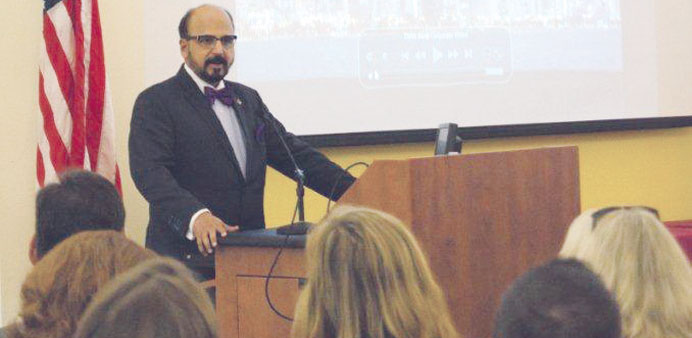Business models are getting realigned in the light of current global, regional and local scenarios and the basic challenges economies face in moving from crisis to stability, said Doha Bank Group CEO, Dr R Seetharaman.
He was making a presentation on “Leadership, Accountability, and Ethics” at the Washington College in Chestertown, Maryland recently.
Seetharaman said, “In 2008 as the financial crisis went from bad to worse, policymakers and business executives struggled. True leaders are those who bring accountability, consistency and ethical practices. Business models need to be realigned by transforming the organisation’s mindset. We should develop the mindset to work in a virtual organisation. Participative leadership is necessary for changing the mind-set and results in improved performance.”
Emphasising on the priorities of leaders for sustaining business growth, he said, “Cross-selling and expanding business domains provide value creation to customers. Continuous innovation is needed synchronising with overall corporate strategy. The key differentiator strategies, which leaders follow includes customer segmentation, focus on specific segments, collaboration with other financial service providers, use of technology to increase efficiency and reach and compete with aggressive products. Good corporate governance encourages accountability and transparency and is part of sustainable business growth.”
Seetharaman highlighted why leaders focus on branding, maintaining that the ‘brand equity’ of the organisation is the key role of today’s CEO and brand strategy is also the most critical step in planning. Ethics also contribute to branding as they represent the values of the organisation.
“Hence we need to protect and build the brand of the organisation,” the Doha Bank CEO said.
Seetharaman explained the human resource factor in leadership, which should focus on grooming people for global environment. Leaders focus on identifying and expanding human talent base, minimising the skill gaps of people, expanding intelligence in products and services and sustaining high satisfaction and motivation level. “Responsibility and accountability promotes leadership development,” he said.
Seetharaman also emphasised the “importance of staying competitive” and highlighted factors, which leaders focus to improve competitiveness.
“Enhanced measurement of business performance, cost rationalisation, quality customer service and improved productivity are key to improving competitiveness. We need to challenge ourselves and look for improvement opportunities.”
He also touched upon how leaders leverage technology for learning.
“Leaders use technology to promote knowledge sharing. Virtual learning environments are the basic component of contemporary distance learning, but can also be integrated with a physical learning environment, which is referred to as blended learning,” Seetharaman said.
The impact of knowledge sharing on achieving strategic objectives is significant. Companies that are the most efficient at turning training and development into business results practice six disciplines of define, design, deliver, drive and document. Performance tools should include learning gained on achievement of objectives.
Leaders, he said should adopt corporate social responsibility to reflect the contribution back to society.

Seetharaman making a presentation on u201cLeadership, Accountability, and Ethicsu201d at the Washington College in Chestertown, Maryland recently.
